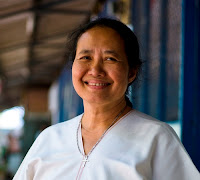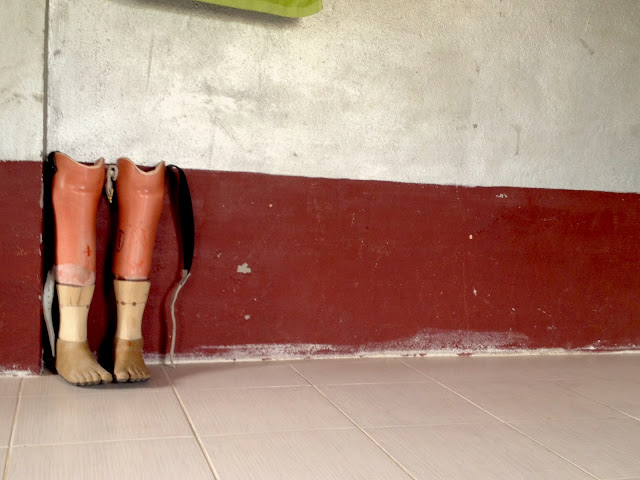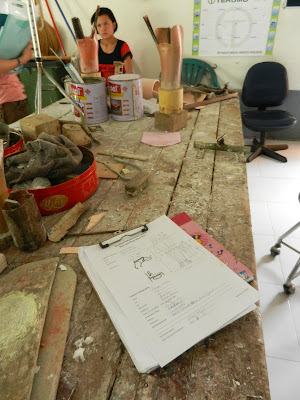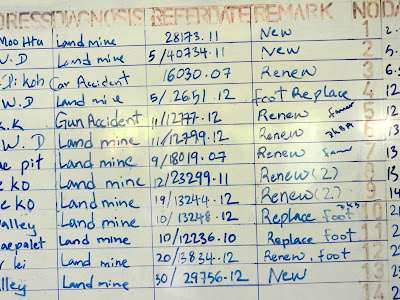 |
| Dr. Cynthia Maung |
Dr. Cynthia Maung fled Burma/Myanmar in 1989 when militants entered her town
and burned her entire village. With a small
group of students, Dr. Cynthia opened a makeshift medical clinic in a rickety
wooden house on the dusty outskirts of Mae Sot, Thailand. All of the clinic’s medical instruments fit
into the woven bag Dr. Cynthia had slung over her shoulder during their
ten-night trek through the jungles of Burma’s eastern border region. With these
limited tools and a commitment to care for all who fled conflict and poverty,
the Mae Tao Clinic was born.
“We didn’t expect to be here 20 years,” Dr. Cynthia says. But unstable
conditions prevented returning to their homeland, so the group continued to
work at the humble clinic using limited resources, medicine, education and
outreach to relieve human suffering and heal broken communities.
 |
| Prosthetic legs awaiting a land mine victim |
Two decades later, the Mae Tao Clinic (MTC) has grown into a comprehensive
community health center and a hub for regional health training with more than
1,000 graduates serving clinics, schools, villages, factories, camps and slums
along both sides of the Thai-Burma border.
 |
| Prosthetic Design and Fitting Table |
Mae Tao Clinic serves a target population of approximately 150,000 and
shoulders an annual caseload of about 90,000 patients. The staff sees between
300-400 patients
per day; runs a jungle field clinic; and feeds 2,000
school children, patients, staff and their families every day. About half of
the clinic’s patients are from the local Burmese migrant community, with the
rest traveling from inside Burma to seek health care.
Mae Tao Clinic treats everything from minor maladies to malaria,
tuberculosis (TB), HIV/AIDS, malnutrition, pneumonia, acute diarrheal diseases,
diabetes, epilepsy, thyroid disease, cancer and mental illness. The clinic’s
medics are trained in surgery, reproductive health (including labor and
delivery), eye health, dental health, prosthetics, pediatrics, lab services,
and social work.
Just last year alone,
they had
280 prosthetic projects, with most of
them needed due to land mine explosions and gunshot wounds that occurred on the
other side of the border.
Each day,
the clinic delivers on average
10 babies.
MTC has set up safe houses for abused women and abandoned children;
counseling and home-based treatment for HIV/AIDS patients; a mobile medic
program to train and equip health workers in areas of Burma that have no
medical care; an education and advocacy program — including 72 migrant school —
to protect thousands of children (many without parents) from malnutrition,
child trafficking and labor exploitation. The clinic also provides emergency
food, shelter and medical care in the wake of environmental and political
crises.
 |
| Prosthetics Project Board - which lists the reasons for each project |
For me personally, the “coolest” (read: most unique, daring, dangerous and
needed) aspect of the Clinic, were the Backpack Doctors. The Backpack Doctors are a small team of
about 2-3 doctors, who travel within Burma/Myanmar bringing medical services,
vaccinations and assistance to those who are trapped within the borders and
remote areas. They are the most needed
aid in that NGOs, governments, and aid workers cannot access this group of
people. There are 95 different backpack “territories”
that each have their own backpacker team which aims to serve 2,000 internally
displaced persons. These teams are the
only source of medical care for these populations. These Backpack Doctors risk their lives each
and every day to bring health care to these isolated communities, and in the
few years that they have been operating, seven doctors have been killed due to
landmines and gunshot wounds, with another two arrested by the government just
last year.



No comments:
Post a Comment